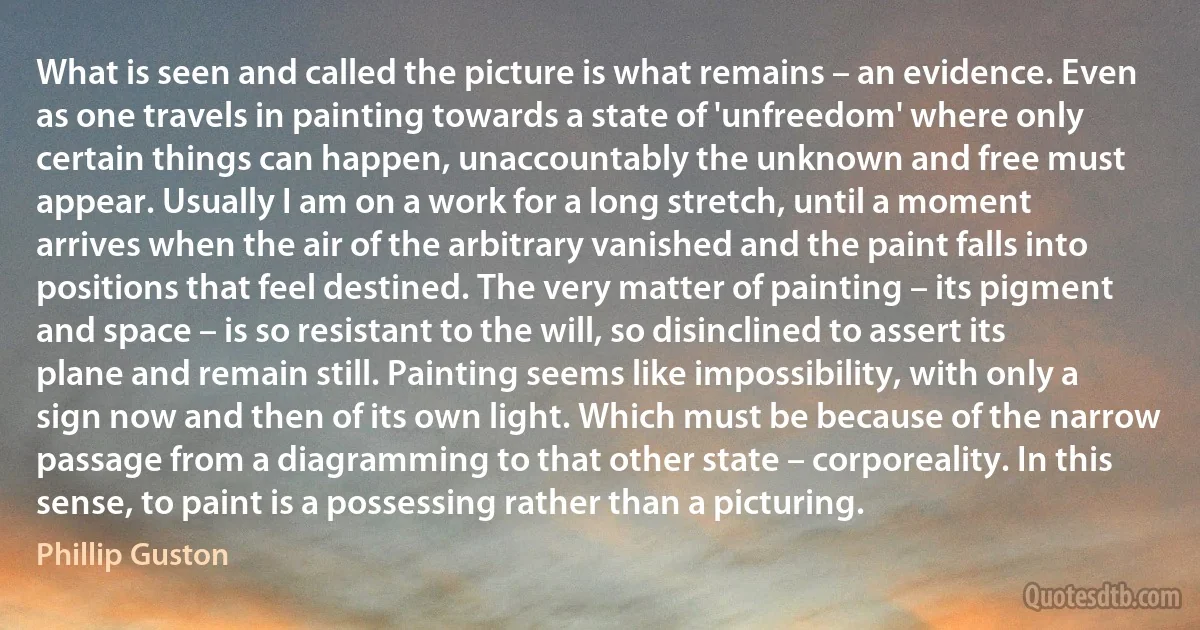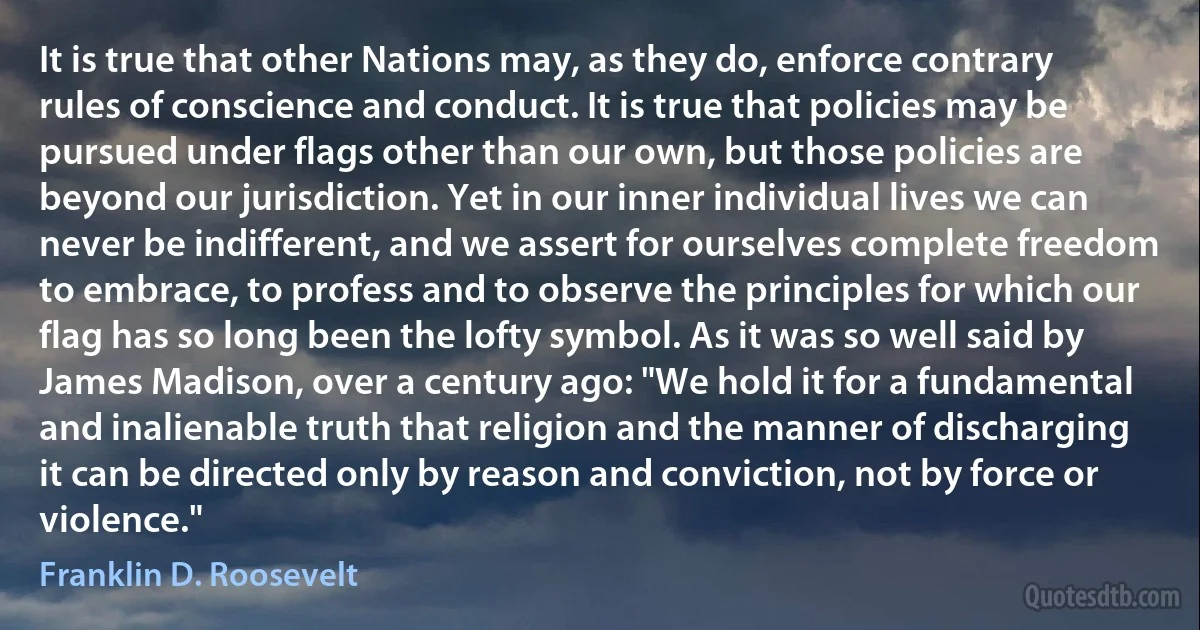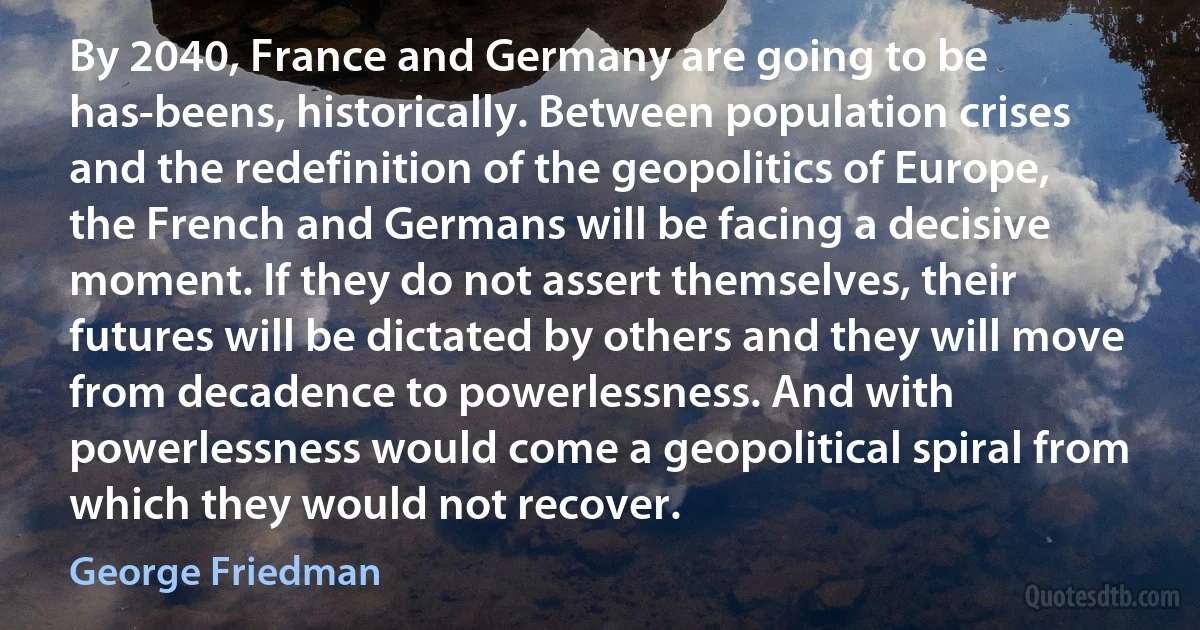Assert Quotes - page 7
If you can give someone the pleasure of not liking you, maybe that's as valid as the pleasure of liking you, some people want to assert themselves by showing the things they don't like. It's a form of positioning yourself. We all do that. I get it. But I'm more focused on the people who do like what we do, and there's a few of them. I like hanging out with those people. If you ever liked Coldplay, then we're going to really deliver on our promise over the next year or so. It's not guarded music. It's about very open things and that might not resonate with some people. But I don't want to obscure our music behind coolness or cynicism just to avoid criticisms. Because for some people it really connects, and I need it, too.

Chris Martin
A science that observes the laws of causation, and so is value-free, threatens human freedom and man's religious, ethical, and legal responsibility. The philosophy of values raised to that challenge, in the sense that it opposed a sphere of values, as a realm of ideal valuations, to a sphere of being that was only causally understood. It was an attempt to assert the human being as a free, responsible creature, indeed not in itself, but at least, in its valuation, what one called value. That attempt was put forth as a positivistic substitute for the metaphysical.

Carl Schmitt
This is preeminently the time to speak the truth, the whole truth, frankly and boldly. Nor need we shrink from honestly facing conditions in our country today. This great Nation will endure as it has endured, will revive and will prosper. So, first of all, let me assert my firm belief that the only thing we have to fear is fear itself - nameless, unreasoning, unjustified terror which paralyzes needed efforts to convert retreat into advance. In every dark hour of our national life a leadership of frankness and vigor has met with that understanding and support of the people themselves which is essential to victory.

Franklin D. Roosevelt
Since the science of nature is conversant with magnitudes, motion, and time, each of which must necessarily be either infinite or finite...[we] should speculate the infinite, and consider whether it is or not; and if it is what it is. ...[A]ll those who appear to have touched on a philosophy of this kind... consider it as a certain principle of beings. Some, indeed, as the Pythagoreans and Plato, consider it, per se, not as being an accident to any thing else, but as having an essential subsistence... the Pythagoreans... consider the infinite as subsisting in sensibles; for they do not make number to be separate; and they assert that what is beyond the heavens is infinite; but Plato says that beyond the heavens there is not any body, nor ideas, because these are no where: he affirms, however, that the infinite is both in sensibles, and in ideas. ...Plato establishes two infinities, viz. the great and the small.

Aristotle
[T]he ancient philosophers... all of them assert that the elements, and those things which are called by them principles, are contraries, though they establish them without reason, as if they were compelled to assert this by truth itself. They differ, however... that some of them assume prior, and others posterior principles; and some of them things more known according to reason, but others such as are more known according to sense: for some establish the hot and the cold, others the moist and the dry, others the odd and the even, and others strife and friendship, as the causes of generation. ...in a certain respect they assert the same things, and speak differently from each other. They assert different things... but the same things, so far as they speak analogously. For they assume principles from the same co-ordination; since, of contraries, some contain, and others are contained.

Aristotle
Thus, while the refugee serfs only wished to be free to develop and assert those conditions of existence which were already there, and hence, in the end, only arrived at free labour, the proletarians, if they are to assert themselves as individuals, will have to abolish the very condition of their existence hitherto (which has, moreover, been that of all society up to the present), namely, labour. Thus they find themselves directly opposed to the form in which, hitherto, the individuals, of which society consists, have given themselves collective expression, that is, the State. In order, therefore, to assert themselves as individuals, they must overthrow the State.

Karl Marx
What a pity and what a poverty of spirit, to assert that beasts are machines deprived of knowledge and sentiment, which affect all their operations in the same manner, which learn nothing, never improve, &c. [...] Some barbarians seize this dog, who so prodigiously excels man in friendship, they nail him to a table, and dissect him living, to show the mezarian veins. You discover in him all the same organs of sentiment which are in yourself. Answer me, machinist, has nature arranged all the springs of sentiment in this animal that he should not feel? Has he nerves to be incapable of suffering? Do not suppose this impertinent contradiction in nature. [...] The animal has received those of sentiment, memory, and a certain number of ideas. Who has bestowed these gifts, who has given these faculties? He who has made the herb of the field to grow, and who makes the earth gravitate towards the sun.

Voltaire
Let us bring the question to the test of experience and fact; and ask ourselves, considering our nature in its entire extent, what light we derive from a sustained and comprehensive view of its component parts, which may enable us to assert with certainty that we do or do not live after death.

Percy Bysshe Shelley
The paucity of its vocabulary and syntax is for the Beats essentially expressive of withdrawal from the standard civilization and its learning. On the other hand this paucity gives, instead of opportunities for thought and problem solving, considerable satisfaction in the act and energy of speaking itself, as is true of any simple adopted language, such as pig Latin. But this can have disadvantages. One learns to one's frustration that they regard talk as an end in itself, as a means of self-expression, without subject matter. In a Beat group it is bad form to assert or deny a proposition as true or false, probable or improbable, or to want to explore its meaning.

Paul Goodman



